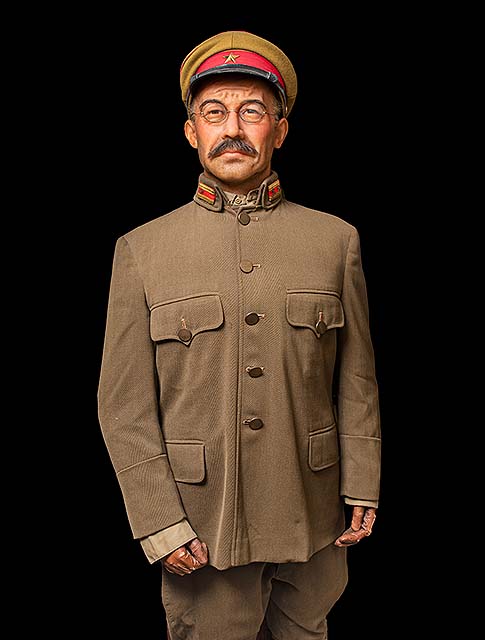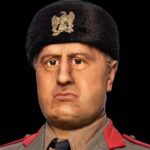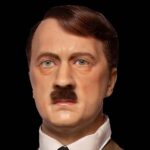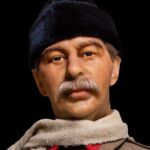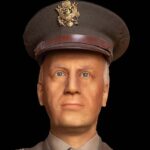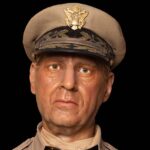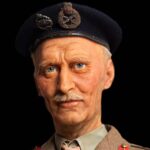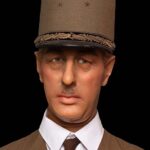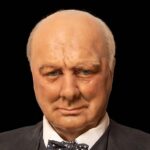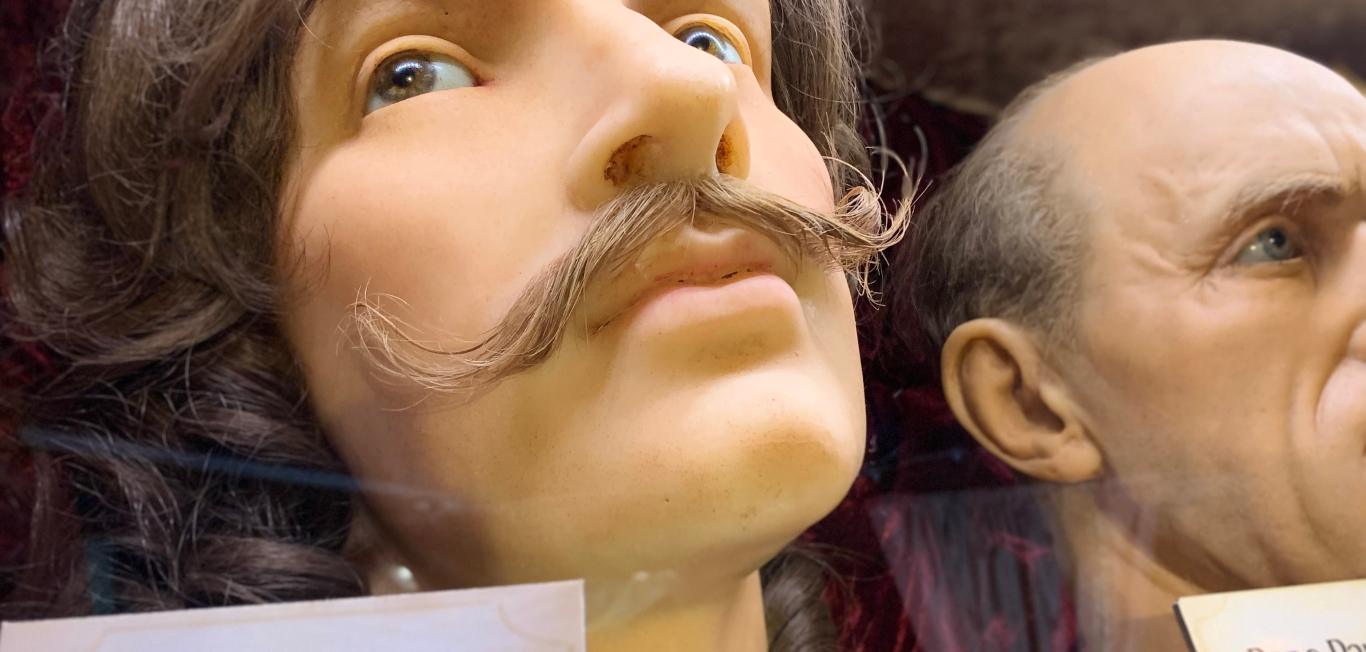Hideki Tojo is an infamous figure in Japan’s history. Born in 1884 in Tokyo, Japan to Hidenori Tojo, Hideki Tojo’s biography chronicles the rise and fall of his military and political career. Hideki Tojo was raised in a military household that came from the last generation of the samurai caste. Following in his father’s footsteps, Hideki was a military officer for the majority of his career. Hideki Tojo graduated from the Imperial Japanese Army Academy in 1905 and, by the 1930s, Tojo rose through the ranks and was promoted to Chief of Staff of the Kwantung Army, overseeing Japanese military operations in northeastern China.
In this role, Hideki Tojo invaded Manchuria and established a military-enforced territory named Manchukuo. Hideki Tojo’s military experience grew to be influential and resourceful to the Japanese government throughout the 1930s. By 1940, the Japanese government named Hideki Tojo Minister of War. As Minister of War, Hideki Tojo promoted Japan’s expansion in East Asia and oversaw the December 7 attacks on Pearl Harbor, forcing the United States to enter World War II.
DID YOU KNOW?
Hideki Tojo oversaw the December 7 attacks on Pearl Harbor.
Towards the end of World War II, Japan’s expansion declined. Japanese leadership questioned Hideki Tojo’s ability to carry out commands and he was forced to step down as Japan’s prime minister. As Hideki Tojo immensely influenced Japan’s military operations, he stayed in a governmental role until Japan’s surrender from World War II in 1944.
Post-surrender, Tojo was arrested and convicted of war crimes and crimes against humanity due to his treatment of prisoners of war and even Japanese citizens. Hideki Tojo was indicted and sentenced to death by hanging along with several Japanese officials. Tojo’s legacy remains controversial in Japan. Some Japanese citizens view him as a hero for fighting to protect Japan’s interests; other citizens view him as a criminal who destroyed lives and the country itself.
Hideki Tojo During World War II
Hideki Tojo was Japan’s prime minister for the majority of World War II. Tojo held this position from 1941 to 1944 until he stepped down to the role of the Japanese government’s military commander. Japan’s robust military largely impacted Japanese politics, which gave military leaders influence in the decisions Japan made to expand its territory and confront Western forces. Many Japanese officials saw going to war as an opportunity to establish their country as the dominant power in Asia. Since the 19th century, Japan had had a reputation for imperialism and expansion, leading Japanese officials to believe it was the country’s destiny to dominate and establish a new reign. Japan experienced a significant economic downfall in the 1930s that led the government to search for alternative solutions to overpopulation, unemployment, and a lack of resources. The pride and support that Japanese citizens had for their nation and military aided Hideki Tojo and official leaders in the decision that the best way to solve these problems was to expand the Japanese territory through East Asia through military force.
As prime minister, Hideki Tojo was instrumental in molding Japan’s military and foreign policies during World War II. Prime Minister was not the only position Hideko Tojo held during World War II. Tojo held several critical military positions that were responsible for determining military tactics for expansion. One of the most notable events in world history is the attack on Pearl Harbor. This catastrophic event was under the order of Prime Minister Hideki Tojo, who believed this would aid his expansion efforts to secure resources in Southeast Asia. After the December 7 attacks on Pearl Harbor, Hideki Tojo progressed with his invasion plan into Southeast Asia and continued attacks on the United States and British military bases in Guam, the Midway Islands, the Philippines, and other locations in the Pacific.
Hideki Tojo’s reign over the Japanese military forces began to fall after a series of losses for Japan during the Battle of Midway and the Guadalcanal campaign. Shortly after these defeats, Japanese officials lost faith in Hideki Tojo’s leadership, and he was forced to step down as prime minister.
DID YOU KNOW?
Tojo held several critical military positions responsible for determining military tactics for expansion.
10 Amazing Facts About Hideki Tojo
Out of the four types of castes that made up Japanese society, the Tojo family held status in the samurai category.
Hideki Tojo was a descendant of a historically militaristic family, with his father being a lieutenant general when Tojo was born. Tojo’s adolescence trained him to have a military mindset and the belief that war is beautiful.
Tojo was an average student but satisfied his superiors with his work ethic.
A commonly known Hideki Tojo fact is that he was a workaholic. Tojo had no interests outside of work; he had no hobbies and was uninterested in family life. Hideki Tojo often brought his work home with him to continue working late at night.
Slapping was a Japanese officer’s technique for training soldiers and instilling discipline, which Tojo found to be effective.
A known fact about Hideki Tojo was his animosity toward Western culture. Tojo found it undermined Japanese traditionalism, and was liberal and grotesque.
Hideki Tojo idolized strength and dictatorship. This resulted in an infatuation with Hitler and Stalin, as they both were globally recognized fascists.
A lesser-known fact about Hideki Tojo was that he held six ministry positions. Throughout his career, Tojo was Prime Minister, Foreign Minister, Minister of Commerce and Industry, Army Minister, Home Minister, and Education Minister.
Throughout the beginning of World War II, Japan was unstoppable. This led to Tojo developing “victory disease,” a level of arrogance that prompted him to plan a mass territorial expansion with nonnegotiable demands.
Tojo was one of 40 war criminals arrested after Japan’s surrender. Before his arrest, Hideki Tojo attempted to commit suicide in order to die with honor by shooting himself in the chest. The bullet missed his heart and he was saved, taken to prison, and eventually sentenced to death for his crimes.
Hideki Tojo’s Early Life
Born on December 30, 1884, in Tokyo, Japan, Hideki Tojo was born as the third son of Hidenori Tojo. Hidenori Tojo was a general in the Imperial Japanese Army. Hidenori’s career had a significant impact on the raising of his family, and he ruled the household with strong military values. Hideki Tojo was a student at the Army Cadet School in Tokyo and graduated in 1905. After graduating from the Cadet School, he was appointed as a second lieutenant in the Imperial Japanese Army, thus beginning his extensive military career. Soon after his first rank achievement, Tojo enrolled in the Army War College and became a staff officer in the Japanese Army.
Tojo married Katsuko Ito, the daughter of a wealthy Tokyo businessman, in 1915. Tojo and Katsuko had seven children. Hideki Tojo raised his family differently from his father and was a devoted family man. Tojo’s military career progressed steadily and, in 1935, he was appointed Chief of Staff of the Kwantung Army (a branch of the Japanese empire) in northeastern China. In this role, Hideki Tojo began his involvement in Japan’s expansion in East Asia. Tojo’s success in this role gained him power and the status of a military leader and politician.
Much of Hideki Tojo’s early life was spent on building a foundation of commitment to Japan and its military traditions. His upbringing instilled these values and the way he viewed the world. These ideals heavily influenced his actions as a government leader for Japan during World War II.
DID YOU KNOW?
Tojo married Katsuko Ito, the daughter of a wealthy Tokyo businessman, in 1915.
Major Accomplishments of Hideki Tojo
By the age of 51, Tojo steadily rose through military ranks and was assigned Command of the Kempaitai (Kwantung Army military police) and earned his second General’s star.
By proving his loyalty to the government, Hideki Tojo advanced to Chief of Staff of the Kempaitai and was appointed Lieutenant General by 1937.
In 1940, Hideki Tojo was appointed Minister of War under the reign of Prince Konoye when he was prime minister.
In 1922, Tojo took his first and only trip to the United States. After his visit, he stated that, unlike the Japanese, Americans are materialistic sensualists with their main mindset being financial gain.
Hideki Tojo was appointed the head of the army’s public relations unit, which was officially known as the war office’s general affairs bureau.
World War II and Conviction for War Crimes
As a military and political leader in Japan, Hideki Tojo played a significant role in World War II. Hideki Tojo was one of the main endorsers of Japan’s aggressive and barbaric expansion policies in East Asia. Tojo achieved aggressive expansion strategies, originally as the Minister of War, and later as prime minister. Hideki Tojo’s leadership was unmatched, as he presented a tenacious commitment to Japan’s imperial ambitions. Hideki Tojo believed that, in order to achieve economic and military security, Japan must expand its territory.
DID YOU KNOW?
Tojo's leadership was unmatched, as he presented a tenacious commitment to Japan's imperial ambitions.
Using a militaristic and authoritarian leadership style, Hideko Tojo directed Japan to bring war upon the United States and other Allies as part of his territory expansion strategy. Tojo played a major role in Japan’s decision to target the United States, as he ordered the Pearl Harbor attacks on December 7, 1941. As Japan’s prime minister, Hideki Tojo oversaw Japan’s military tactics and operations throughout World War II. Within three years of the attack on Pearl Harbor, Japan’s war strategies began to fail, and Tojo’s leadership abilities came into question. In 1944, Hideki Tojo resigned as prime minister, but he still remained in a leading governmental role until the end of World War II.
Japan surrendered in 1945. Shortly after, the Allies arrested Tojo and charged him with war crimes alongside six other Japanese officials. In order to escape persecution, Hideki Tojo attempted suicide so that he could die with honor. Tojo shot himself in the chest, but the bullet missed his heart. His suicide attempt failed, and Hideki Tojo was placed in custody until trial. Hideki Tojo’s trial took place in Tokyo, Japan, where he was indicted with crimes against peace and humanity, and war crimes. These charges were warranted due to Hideki Tojo ordering the attack on Pearl Harbor, and his maltreatment of prisoners of war. Adding to Tojo’s charges, the Tribunal held Tojo liable for the deaths of millions of people in Japan and other countries due to his misconduct during the war. Guilty on all charges, Hideki Tojo was sentenced to death by hanging.
Tojo’s role in World War II is widely recognized as a critical part of Japan’s history and the broader history of World War II. Hideki Tojo’s conviction revolutionized international law and established the principle of individual responsibility for war crimes and crimes against humanity. The same principle used in the Tokyo trial was also applied when Nazi officials were later tried.
Hideki Tojo Late in Life
In 1948, Hideki Tojo was convicted of heinous war crimes and spent several years in prison anticipating his execution. Throughout his prison sentence, Hideki Tojo wrote letters to his family and friends and occupied his time with theological reflection. By the end of his sentence, Hideki Tojo had converted to Christianity. Tojo conveyed regret for his actions during the war, and he accepted responsibility for Japan’s aggression and barbarity toward its own citizens. On December 23, 1948, Hideki Tojo was executed at Sugamo Prison in Tokyo. He was hanged alongside six other Japanese officials who had also been charged with war crimes. To prevent any public outbursts, there was no announcement of the execution until it was complete. Hideki Tojo’s death marked a crucial time of transition in Japanese history. Japan was now leaving behind an unruly era and entering a new age of peace and community. Tojo’s execution was viewed as a step toward reconciliation with Japan’s former enemies, and the country began to repair the devastation that occurred in their homeland during the war.
Over 70 years since Hideki Tojo’s death, there is still much controversy over what he has done for the country. Is he an enemy or a patriot? Some say he is a patriot for fighting to protect Japan’s interests; others say he is an enemy, as his army is responsible for the death of millions of people, both international and domestic. Hideki Tojo left a dishonorable legacy to his family. As a result of his actions, Tojo’s family has faced scrutiny and been ostracized by their peers since the end of the war. Tojo’s actions brought so much shame to his family that his daughter committed suicide due to the poor treatment she received because of her father’s actions.
Is he an enemy or a patriot?
Recently, there have been some revisions to how Hideki Tojo is viewed in Japan. Many argue that Tojo’s actions were a direct result of how Japanese boys were raised to behave, and Tojo’s family was the last of the samurai caste. Tojo’s political power was expected and appreciated back then, even though most of the world was following the status quo of making peace and enacting treaties. Regardless of the contention about Hideki Tojo’s life choices, he is still an important figure in Japanese history and World War II. His legacy is a reminder of the devastating consequences of poor actions, and the importance of international peace and cooperation to prevent future conflicts.
FAQs
How did Tōjō Hideki change the world?
Hideki Tojo changed the world through several military and political orders. The most notable were Pearl Harbor, the continuous expansion of war with China, and his involvement with human torture and enslavement.
Where was Tōjō Hideki educated?
Tojo’s youth was spent being educated in the Meiji educational system, which turned boys into soldiers. When he was older, Tojo enrolled in the Army Cadet School in 1899.
How did Tōjō Hideki die?
Hideki Tojo was sentenced to death for war crimes and was hanged on December 23, 1948.
Where is Tōjō Hideki buried?
Immediately after his death, Hideki Tojo was cremated and his ashes were spread across the Pacific Ocean. Tojo was given a shrine at the Yasukuni Shrine and has a commemorative tomb in Nishio, Aichi.
